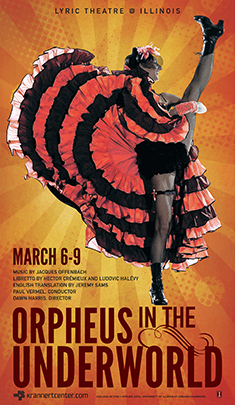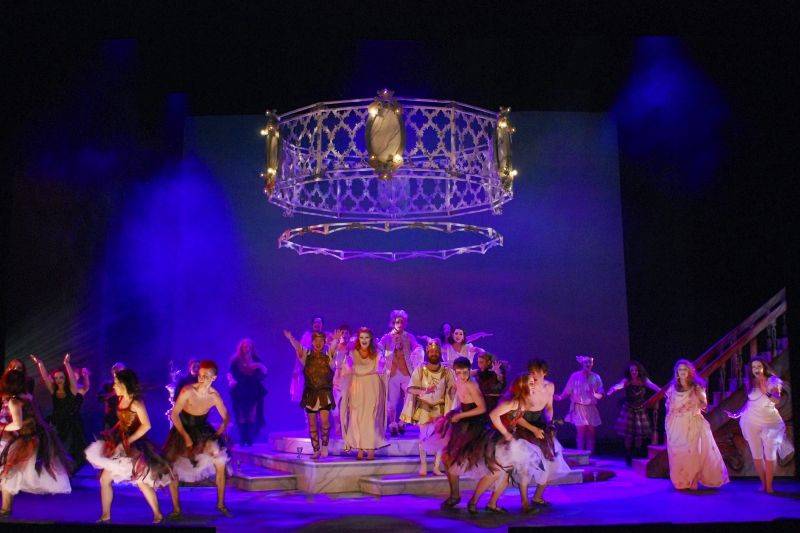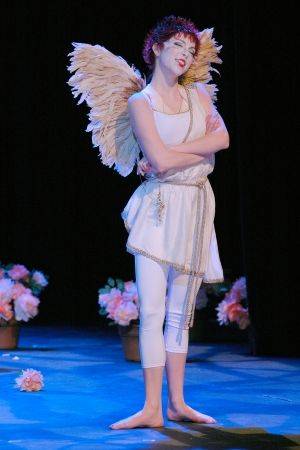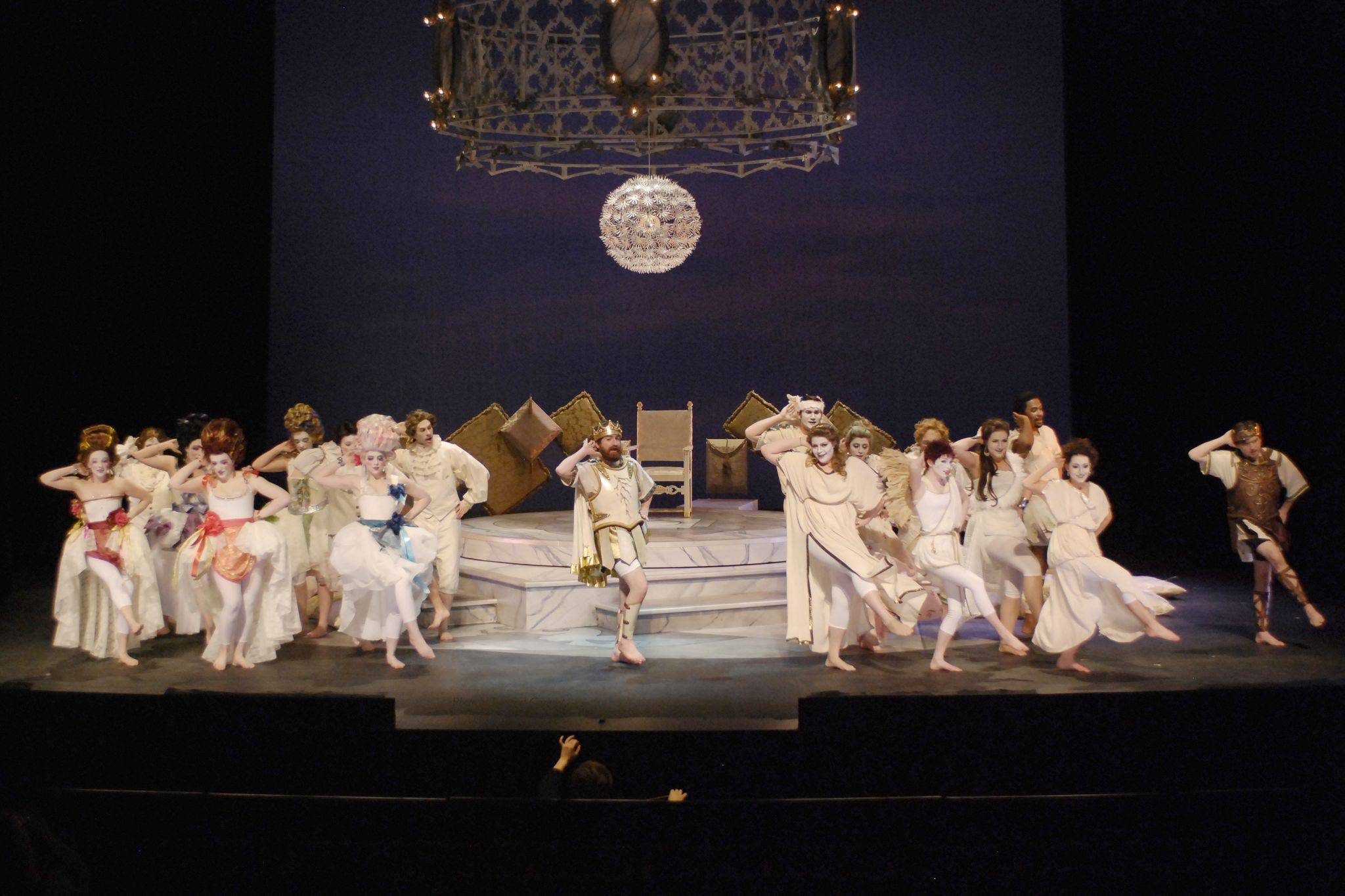This show is as close to opera meets Monty Python as we will ever see on a stage again. It embraces its outrageous humor with outlandish costumes and well-choreographed dances that leave audiences’ heads spinning.
Orpheus in the Underworld started off on a rather high note in its opening night at the Krannert Center for the Performing Arts this Thursday. It introduced its audience to a contemporary opera, which may have left some of its audience members scratching their heads. The strangeness of it all was indeed something that only the gods of Mount Olympus could pull off with such effortlessness.
To begin with, the crowd was clapping. Nothing had happened yet. I searched the stage for some sign that the show may actually be starting, but unfortunately there wasn’t any indication. It was a few minutes past 7:30. I held my breath in anticipation. Then I realized that they (and by they I mean we) were clapping for the orchestra located underneath the stage. I only saw the glimmer of the conductor’s baton held high above his head to indicate there was any human life below.
 The sounds that were produced from deep below and created by the symphony orchestra were a rare and magical thing that can only be explained by saying “you just had to be there.” I found myself clapping to the scores of “The Gallop Infernal (aka ‘The Can-Can’)” with a vigor I didn’t know I possessed.
The sounds that were produced from deep below and created by the symphony orchestra were a rare and magical thing that can only be explained by saying “you just had to be there.” I found myself clapping to the scores of “The Gallop Infernal (aka ‘The Can-Can’)” with a vigor I didn’t know I possessed.
For an opera that dates back to 1858, this all seemed exceptionally modern. Although I’m sure that it is a far cry from its original production, it does feature the same plot, music, and social humor. I think that they probably didn’t have Political Opinion taking selfies with Cupid or Mercury riding around on a Razor scooter to deliver messages to the gods; but other than those minor details, I could see the antiquity within the performance.
This show is divided into two acts with four scenes. The beginning of the performance introduces us to Orpheus and Eurydice, the two famed lovers from Greek mythology. In the original version of the myth, Orpheus must go down to the underworld to rescue his beloved Eurydice from Hades, who has stolen her away. He hopes that his beautiful music will be able to win over Hades so that she can return with him to Earth. Hades agrees that he will allow Eurydice to return with Orpheus, as long as Eurydice walks behind him as they exit Hell and Orpheus does not look back at her. Orpheus accepts these conditions but cannot stop himself from looking back at his wife; thus, he loses her forever.
Jacques Offenbach had a bit of a different idea for his version of Orpheus in the Underworld. From the very beginning, the audience senses that something isn’t quite right with the two main characters. We’re introduced to a stage set with pretty flowers, but the girl who we soon learn is Eurydice is not picking flowers and singing for her husband. She is actually having an affair with the Shepard neighbor named Aristaeus. Orpheus soon joins the fun but mistakenly plays his new concerto for Phoebe. We learn that both couples are engaged in affairs, but Orpheus’s concern for public opinion keeps his from leaving his wife, Eurydice. Orpheus warns Eurydice that she should not allow Aristaeus to go in her flowers because a surprise waits for him.

Aristaeus enters the stage, and we soon learn how treacherous he really is as he kills Eurydice with the trap that was set for him. She is taken to the underworld where we learn who Aristaeus really is: Pluto, lord of Hell.
Let me just point out that Benjamin Krumreig (Aristaeus/Pluto) plays such a great villain. I’m not sure what he’s like in real life, but as a villain he is alternately charming, funny, and downright mean. I could sense the jealousy in his eyes when he realized that his brother Jupiter was also in love with Eurydice—and that she returned her affections for Jupiter but not for him. There were parts of this show when, even if the spotlight was meant to be on other people, it still seemed to be on Krumreig at every moment. We the audience waited breathlessly to see what his next devious plan of action was.
As Eurydice, Lara Semetko reminded me of Rapunzel from the Disney update Tangled. I’m not sure if it was her long blonde hair or her beautiful voice, but she definitely holds the stage and has an unforgettable quality. She plays the attention-deprived Eurydice with such confidence, even making tiny flaws hysterical—like when she was trying to break Orpheus’s violin bow but it took her three tries. This made the scene somehow even funnier then it might have originally been.
 Michael O’Halloran (Jupiter) portrays a flamboyant god that has been handed everything. He’s the person that you love to hate because he always gets what he wants. O’Halloran did a great job with this character, especially the scene where he transforms into a fly to save Eurydice. Most people couldn’t pull off black tights, bug goggles, and a peculiar antenna headpiece with such conviction and poise, but he somehow managed to impress even the disbelievers.
Michael O’Halloran (Jupiter) portrays a flamboyant god that has been handed everything. He’s the person that you love to hate because he always gets what he wants. O’Halloran did a great job with this character, especially the scene where he transforms into a fly to save Eurydice. Most people couldn’t pull off black tights, bug goggles, and a peculiar antenna headpiece with such conviction and poise, but he somehow managed to impress even the disbelievers.
Overall, the performance was simple in its staging and breathtaking in its execution. The comedy wasn’t overdone, and it was just outlandish enough to make me laugh and feel like I was watching something that Monty Python might have done well. The production’s choreographer, Rebecca Nettl-Fiol, did an exceptional job with the fly dance, especially the bit where the dancers are on the ground looking like they are stuck on their backs. That hysterical bit in particular was spot-on.
If you’re in the mood for some light-hearted fun that will leave you with laugh-pains at the end of the night, then this show is for you. It’s a party that is straight out of this underworld, and it’s a performance in which everyone can find something they will adore.
All photos by Laurent Gasquet.








